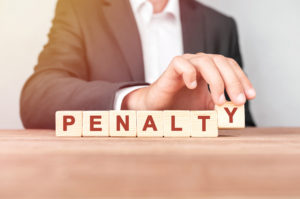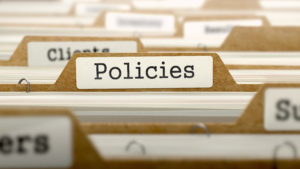When drafting HOA fine policies, an HOA board must keep homeowner rights in mind. Whether your HOA is just starting out or has existed for years, it is important to act within the law and governing documents. Here are some things you must consider before finalizing your HOA fine policy.
Understanding the Legality of HOA Fine Policies
While it is easy to get caught up in fines and violations, HOAs must do their due diligence to protect themselves from liability. This includes making sure association policies are reasonable and lawful. One common point of contention has to do with HOA fines. But, can an HOA even levy fines against its homeowners? And are there even limits to the HOA fine policies an association can enforce? Let’s find out.
The Purpose of a Homeowner Association Fine
 Fines are commonplace in the HOA scene. In fact, a majority of associations impose fines in an effort to deter homeowners from breaking the rules and regulations within a community.
Fines are commonplace in the HOA scene. In fact, a majority of associations impose fines in an effort to deter homeowners from breaking the rules and regulations within a community.
Not all HOAs are created equal, though. Some associations have light HOA fine policies, while others enforce them more aggressively.
What are HOA fines?
Fines or penalties serve two main purposes within the context of an HOA community. The first is to allow the HOA board to enforce the governing documents without obstacles. In short, it is a way for board members to deal with residents who disobey rules without immediately resorting to legal action.
While warning letters sometimes get the job done, people are warier about following rules when there are monetary penalties. This is the second purpose of HOA fines. They discourage homeowners association violations. Although fines may not dissuade residents who have no problem with losing money, the humiliation of getting called out by the board for a violation is sometimes more than enough.
Can a Homeowner Association Fine You?
Now that you know the purpose of HOA fines, it is time to answer the question commonly asked by homeowners: Can an HOA fine you? Short answer, yes. An association can levy a fine against a resident who has broken the rules, provided the authority is granted to the board by the governing documents.
Some governing documents explicitly state the board’s authority to impose fines, while others only imply it. If your governing documents contain no such provisions, consider amending them to grant the HOA board that power.
It is also imperative to have a proper procedure in place when it comes to violations. Frequently, HOA boards start by sending a notice of warning to the violator. Only when the resident commits the same violation for the second time will they warrant a fine. Depending on the state where your HOA resides, a hearing may be required before imposing the fine. The HOA board may also need to send the alleged violator an advance notice of the hearing with all pertinent details.
Describe your HOA fine policies in detail so that nothing is left open for interpretation. This way, the board has a concrete procedure to follow and can set the proper precedence for future board members.
However, it is not enough to have a procedure for fines and violations. The HOA board also has a duty to educate homeowners on HOA policies. This means keeping residents updated on new policies, procedures, and rules. If a resident breaks a rule that was never made known to them in the first place, the board must not hold the violation against them.
How Much to Fine a Violator
 When deciding how much to fine someone, it is important not to set the amount too low or too high. Too small an amount will not deter homeowners from breaking the rules, while a fine too large might be considered extortion. A good range most HOAs follow is somewhere between $25 to $50 per violation.
When deciding how much to fine someone, it is important not to set the amount too low or too high. Too small an amount will not deter homeowners from breaking the rules, while a fine too large might be considered extortion. A good range most HOAs follow is somewhere between $25 to $50 per violation.
Of course, you must also keep the community’s economic status in mind. For example, a $25 fine may not be enough to discourage residents in a wealthy and upscale HOA community. It is also important to consider the severity of the violation. Smaller violations can rack up smaller fines.
On the other hand, larger violations may warrant larger fines, especially if the violation has serious consequences such as risking the safety of other members or economic losses. It would be unreasonable to levy a $200 fine against a homeowner who simply failed to clean up after their dog.
Moreover, it is a good idea to adopt an escalating system for your HOA fine policies. When a resident commits a violation the first time, you can let them get away with it with just a warning letter. If they do it again, you can charge them $25, and then $50 for the third time. You can then increase this to $100 for the fourth time and for every succeeding violation.
It is not advisable, though, to perpetually increase the fine amount. There should be a maximum or a limit; otherwise, the fine could blow up to unreasonable proportions. Some states even have laws against this. For instance, in North Carolina, a fine must not exceed $100.
How to Collect Unpaid Fines
In an ideal world, all homeowners would settle their fines in a timely manner and come out of the experience a better person. Unfortunately, the real world is not as forgiving. Should a homeowner fail to pay the fine, the HOA board can turn to one of two ways to ensure collection:
- Small Claims Court. Taking your case to a small claims court is easy and inexpensive. Plus, there is no need for an attorney. The downside to this, though, is that judges can be antagonistic towards HOAs and there is no way to appeal a decision.
- Superior Court. This process takes more time and effort since it requires filing a lawsuit and an attorney. There is also a chance it could end up in a trial.
A Fair Fine Policy Keeps an HOA Protected
 When defining your HOA fine policies, it is essential to consider homeowner rights and state laws. You do not want to give homeowners a reason to take legal action against your board.
When defining your HOA fine policies, it is essential to consider homeowner rights and state laws. You do not want to give homeowners a reason to take legal action against your board.
If homeowners feel their rights are being violated, they will not hesitate to learn how to fight HOA fines and follow through. Remember to act within reason and remain consistent when implementing policies.
If your HOA is having trouble constructing its fine policy, you will benefit from hiring an HOA management company. In that case, do not hesitate to reach out to us.
RELATED ARTICLES:
- HOA Selective Enforcement: Playing It Fair
- Can The Board Make Decisions In An HOA Without Consulting Homeowners?
- Can Homeowners Association Raise The Fees?






